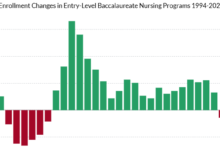English language changes allow 1,000 nurses to join register

Almost 1,000 internationally educated nurses have now joined the Nursing and Midwifery Council (NMC) register thanks to changes to its English language requirements.
Marking one year since the regulator began to allow supporting information from employers (SIFE) as evidence of English language proficiency, Nursing Times has been told what the impact of the changes has been.
The NMC introduced changes to its English language requirements on 8 February 2023, following a wide-scale public consultation and months of campaigning from nurses.
The amendments mean that applicants who trained in English, but in a country where English is not a majority spoken language, can now provide supporting information from their UK employer as evidence of English language proficiency rather than having to take an exam.
In addition, nurses relying on an English language test to show their competence can also submit supporting information from employers if they narrowly miss out on the required score by half a point or grade in one of the four language domains of the test.
NMC executive director of strategy and insight, Matthew McClelland, told Nursing Times that the English language requirements made sure that nurses, midwives and nursing associates “can communicate effectively” with their colleagues and people who use their services.
Between February 2023 and December 2023, 959 international applicants joined the register via this pathway, the NMC confirmed.
Mr McClelland added: “It’s fantastic that so many skilled and knowledgeable professionals, who have demonstrated a good standard of English while working in UK health and social care, have been able to join our register and start making a positive difference to people’s health and wellbeing.
“We know from feedback that professionals and employers are also pleased with our more flexible approach to upholding standards.”
Eldho Abraham, a post-anaesthetic care practitioner at Northampton General Hospital, joined the NMC register through the SIFE pathway in April 2023, after eight failed attempts at passing the English language test.
Mr Abraham had been working as a nurse in Kerala, India for seven years before he came to the UK in 2014.
He began working as a theatre support worker in the NHS while he tried to pass the English language test.
Mr Abraham told Nursing Times that, at points, he had become “emotionally drained” watching nursing colleagues undertake tasks that he used to do as a registered nurse in Kerala.
“[My colleagues] were doing some procedures which I used to do back home, but here I was not allowed because I was a healthcare assistant,” said Mr Abraham.
However, when the NMC announced that it would make changes to its English language requirements, Mr Abraham finally found a way forward.
He said: “My managers were very supportive, they’d gone through all the documents and verified my language [competencies].
“I got my PIN 10 to 13 days after SIFE was implemented.”
OSCE testing capacity increases to 50,000
In other NMC news, the regulator announced today that the total number of candidates who can take its objective structured clinical examination (OSCE) each year has been further increased, to 50,000.
The OSCE is a practical exam which makes up one half of the NMC’s test of competence.
It ensures that internationally educated professionals and those rejoining the register after a break have the skills and knowledge to provide safe and effective care.
There are five OSCE test centre partners across the UK: the University of Ulster, Northumbria University, Oxford Brookes University, the University of Northampton and Leeds Teaching Hospitals NHS Trust.
Last year, Northumbria University increased its testing capacity from 7,000 candidates to 22,000.
Now, Ulster University will be expanding its OSCE testing capacity to accommodate up to 8,00 more applicants in Northern Ireland.
Two individuals who campaigned for years for the NMC to make changes to its English language requirements are Dr Agimol Pradeep, liver transplant coordinator at King’s College Hospital, and Dr Dilla Davis, nursing lecturer at King’s College London.
Their campaign began in 2020, on behalf of thousands of India-trained nurses who were unable to pass the English language test and achieve registration, despite living and working as healthcare support workers in the UK.
Dr Pradeep told Nursing Times that introducing SIFE was “one of the best pathways to address the scarcity of nurses in the UK” as well as reward internationally educated nurses who had been working in the support workforce, sometimes for years.

From left, Agimol Pradeep and Dilla Davis
She said: “When I was listening to these nurses during early 2020, I was hearing loss of hopes and dreams and frustration in their voice.
“But since 8 February 2023 I can hear joy and hope.
“Also, many of these nurses have started progressing in their careers already.”
Meanwhile, Dr Davis told Nursing Times that the SIFE pathway was a chance for internationally educated nurses to “showcase their skills and dedication with the unwavering support of their employers”.
She said: “Beyond its technical merit, the SIFE pathway brings together employers and prospective candidates in a shared journey toward achieving the NMC PIN.
“Employers become more than assessors, they become champions nurturing their employees’ growth and ensuring their language proficiency aligns seamlessly with the demands of their roles.”




